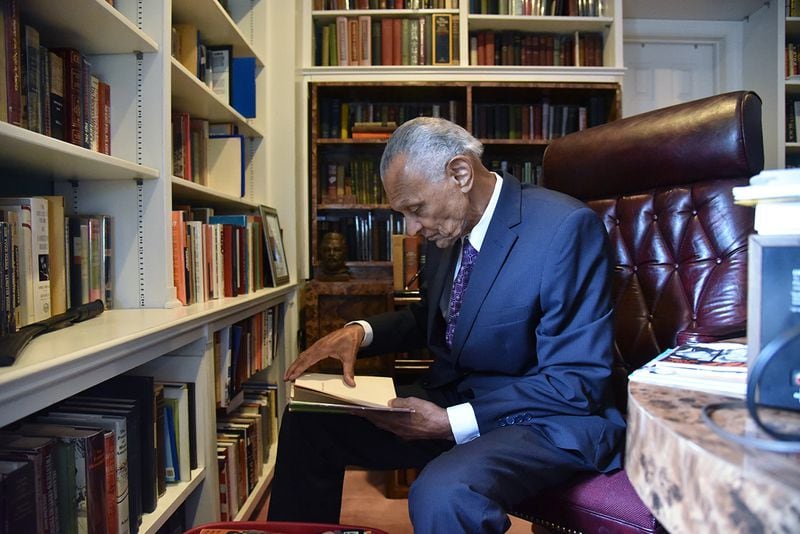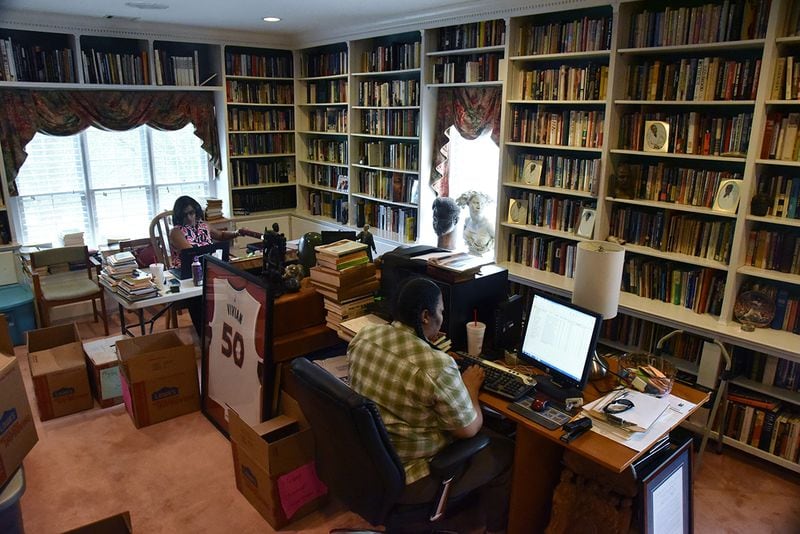When C.T. Vivian was growing up in Macomb, Ill., one of his favorite places was the local library. All of the librarians knew him and eagerly fed his reading habit.
Few blacks actually used the McComb library then, and they found even fewer books there that were written for or about them.
"Nowhere in town was there a place to really know who we were as a black person," said the 93-year-old civil rights icon and Presidential Medal of Freedom recipient. "You had to find out by accident."
» PHOTOS: Inside C.T. Vivian's amazing library
» More on Georgia's racial transformation
Once such accident was young Vivian’s discovery of a book on a high shelf at the library. The title is lost to him now, but he has never forgotten the book, which chronicled the lives of extraordinary black men and women.
“That was the only book in that library that was totally black,” Vivian. “We were always seen through the eyes of whites.”
Credit: HYOSUB SHIN / AJC
Credit: HYOSUB SHIN / AJC
It was at that point that the future civil rights leader became a collector. A collector of books largely about the black experience and written by black authors. Over nearly 80 years, Vivian has amassed a collection of more than 6,000 volumes, including first editions, by the likes of Ralph Ellison, Langston Hughes and W.E.B. Du Bois. Some are signed, like a copy of Phillis Wheatley's 1773 "Poems on Various Subjects, Religious and Moral," the first known book authored by an African-American woman.
“Dad reads all the time,” said Vivian’s daughter, Denise Morse. “Growing up, we had books everywhere. On every table, stacked in the corners. He and mom would get in a car and drive to California, stopping at little bookstores along the way. They would come home with a trunk load of books.”
The question now is what to do with the collection. And the city of Atlanta and a local developer have come up with an answer.
Vivian is donating his collection to the National Monuments Foundation for inclusion in the Peace Column, the centerpiece of the upcoming Rodney Cook Sr. Park in Vine City. The C.T. Vivian Library will be housed within the base of the 110-foot column.
“C.T.’s library is the gravitas for the Peace Column Museum that gives it its anchor,” said Rodney Cook Jr., the CEO of the National Monuments Foundation and the son of the park’s namesake.
The Peace Column will be the National Monument Foundation’s third major installation in Atlanta, following the Millennium Gate Museum, a 101-foot arch based on Rome’s Arch of Titus, and the Prince of Wales’ Olympics Monument.
“Great cities have great monuments and great public spaces to bring those cities together,” Cook said. “So I wonder how a city this big can last if it’s leading attraction is the Georgia World Congress Center. We need cathedrals. Parks. Museums to truly become a cosmopolitan, global place.”
In May, the city – hoping that it will trigger a rebirth of Vine City — broke ground on Rodney Cook Sr. Park in the shadow of both Mercedes-Benz Stadium and the former home of Martin Luther King Jr.
Along with the peace column, there will be 18 monuments to civil rights leaders scattered throughout the 16-acre, $45 million park. Cook Sr., a former Atlanta alderman and state representative, was one of the few white elected officials who voted to seat Julian Bond in the Georgia House of Representatives in 1966. Cook Sr. died in 2013.
Credit: HYOSUB SHIN / AJC
Credit: HYOSUB SHIN / AJC
The library in Vivian’s southwest Atlanta home is in a word, amazing. On Wednesday, his youngest daughter, Charisse Thornton, and Dawnn Mitchell painstakingly catalogued the collection, which stretches through several rooms of Vivan’s house. They haven’t even gone through his personal papers or his massive art collection, which will not be included in the official library.
Thousands of books, some dating to the early 1800s, line the walls, along with volumes of old black magazines like Negro Digest and Jet. Busts of bold black faces sit on pedestals. Photographs of his late wife, Octavia, rest on his desk.
“We never thought the collection was valuable in a sense of money,” Vivian said. “They were valuable in the sense that we can read our history. I want every black child to be able to read about themselves. So books about black people were always nearby for my children and for anyone who wanted to read about black people and understand how we got this history.”
Mitchell, who grew up in New York City, can hardly concentrate on cataloguing in lieu of listening to Vivian. Because the library is being organized, Mitchell had to find a copy of poems by Vivian’s favorite poet, Claude McKay, a seminal figure from the Harlem Renaissance.
He explains to her how McKay, whom he met once, could write such tender love poems like “To O.E.A,” then offer blistering racial critiques like, “If We Must Die.”
Finding the poems, he sits at his desks and recites them.
“I could sit here and listen to him all day,” Mitchell said.
With the vastness of the library and the résumé of the owner, the fate of the Vivian’s book collection has been a topic of speculation for years. Morse, treasurer of the C.T. & Octavia Vivian Museum and Archives, said several organizations and colleges have offered to take the library.
“We have been thinking for some time about where it would go but were never able to come up with a place where we felt we fit in. Then he arrived and it just fit,” Vivian said. “It couldn’t have worked out any better.”
With more than 6,000 volumes, C.T. Vivian’s book collection is one of the most extensive collections of black literature in the city. The collection, will soon anchor the Peace Column in the upcoming Rodney Cook Sr. Park in Vine City as the C.T. Vivian Library.
Here is a snapshot of some of the books in the collection.
Poems on Various Subjects, Religious and Moral: Written in 1773 by Phillis Wheatley, "Poems," is the oldest book in the collection. Born in African and stolen to Boston as a child, Wheatley quickly mastered English and learned to read and write. When nobody believed that Africans had the capacity to write poetry, Wheatley was put in front of a panel of 18 prominent Bostonians — including the Reverend Charles Chauncey, John Hancock, Thomas Hutchinson, the governor of Massachusetts — to prove it. Satisified, they wrote a preface to the book. Vivian owns a signed edition.
"The Black Man: His Antecedents, His Genius, and His Achievements: Published in 1863, by William Wells Brown, the book, traces the lives of men like Nat Turner, Crispus Attucks, Denmark Vesey and Henry Highland Garnett — who had, through "genius, capacity, and intellectual development, surmounted the many obstacles which slavery and prejudice have thrown in their way," and "raised themselves to positions of honor and influence."
Journal of Negro History: Was a quarterly academic journal founded in 1916 by historian Carter G. Woodson that covered African American life and history. Each edition, through the end of its run in 2001, is bound in green. Vivian has the whole collection.
The Penitential Tyrant; or, Slave Trader Reformed: a Pathetic Poem, in Four Cantos: Written in 1807 by abolitionist Thomas Branagan, the book is his stern opposition to slavery.
Letters of the Late Ignatius Sancho, An African: Sancho was a British composer, actor and writer. A former slave, he was seen as an "the extraordinary Negro," and a symbol of the humanity of Africans and immorality of the slave trade. In 1782, two years after his death, a series of 160 of his letters were published in a book, marking one of the earliest accounts of African slavery written in English by a former slave of Spanish and English families. Vivian has a 1784 edition.








